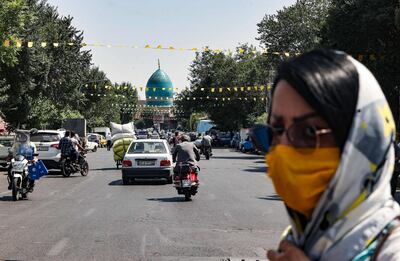Iran's new president is off to an inauspicious start. Ebrahim Raisi's first press conference after he was elected indicated the Islamic Republic's conservative wing's complete hold on power and the entrenchment of its hardline foreign policy. Iran declared that it would not negotiate over its ballistic missile programme or its support of proxy militias throughout the Middle East that have devastated nation states and turned them into mere protectorates of Tehran.
Perhaps this is to be expected from the so-called "hanging judge," a career prosecutor and then leader of Iran's judiciary, who made a name for himself as a part of the revolutionary tribunals that sent thousands of former regime officials and political opponents to their deaths in the early years of the Republic, and who presided over the execution of many activists in the intervening years.
But it does not bode well for the stability of a region that has been wracked by proxy conflicts, many of them instigated by Iran’s insatiable desire to project its power and influence. It raises questions about what can be gleaned from renewed nuclear negotiations that the US has signaled it is willing to partake in – what good is a lifting of sanctions before the talks meant to stabilise the region if they will simply free up Iran’s regime to fund its militias’ adventures abroad?
Mr Raisi's ascent to the presidency in elections held earlier this month was an exercise in democratic pageantry with none of the substance. An uncharismatic leader, he was beaten in previous elections by the outgoing president, Hassan Rouhani, but that was not a problem this time around because the clerical council that decides who can run disqualified every potential rival to Mr Raisi, a loyalist of Iran's Supreme Leader Ayatollah Ali Khamenei. This included conservatives, such as former parliamentary speaker Ali Larijani.

Mr Raisi has been touted as a potential successor to Mr Khamenei, who is old and in poor health, and the conservative hold on power removes some of the obstacles to continuing Iran’s current trajectory that has made it a pariah on the international stage. The veneer of democracy is fooling nobody this time around largely because, aside from a ballot, the regime has done away with it altogether.
But it is in its foreign policy that more of the same can be disastrous for the region at large.
Despite farcical gestures of reconciliation and rapprochement, Iran has continued to wield its proxies to sow chaos in the region.
In Lebanon, Hezbollah continues to grip power on the ground. After presiding over the crushing of street protests that preceded the coronavirus pandemic, Hezbollah has remained entrenched in the ruling establishment, shielding it from accountability for the explosion last year that levelled much of the capital Beirut.
The country has since spiralled into a failed state with a reeling economy that has seen its citizens' savings wiped out by a currency crash and an insolvent banking system, rampant fuel shortages and crushing poverty. And it appears unlikely that the situation will change anytime soon.
In Iraq, Tehran-backed militias continue to hold sway, and have used their influence and power to exact punishment from any who dare to protest their hold over the country. The militias have continued to assassinate activists and journalists with impunity at the barest hint of criticism.
In Syria as well, Iran has played a crucial role in keeping President Bashar Al Assad in power – what both regimes think of the will of the people was illustrated during the Syrian presidential elections last month, when Iranian foreign minister Javad Zarif offered the expertise of Iranian election observers to help ensure a free and fair vote.
Iran continues to wield influence in the war-torn nation, which is also in the grips of an economic crisis due to the lack of reconstruction funds and ongoing sanctions, having spent a decade crushing a popular uprising and transforming it into a civil war fuelled by sectarianism.
There is little that Mr Raisi can change in the course of Iranian foreign policy, which even the country's outgoing foreign minister admitted was out of his hands. Mr Khamenei and his Revolutionary Guards set the country's trajectory abroad and at home.
But Mr Raisi’s election and his subsequent public hardline stance shows the regime’s implacable intent. It appears to see no reason to make peace with its neighbours, to restrict its hegemonic tendencies, to refrain from obstructing the development of nations that have long been tormented by geopolitical ambitions, all for the purpose of projecting its power.
The only difference now is that the false mask of diplomatic niceties of the outgoing Iranian administration has also been cast aside.
Kareem Shaheen is a veteran Middle East correspondent in Canada and a columnist for The National



